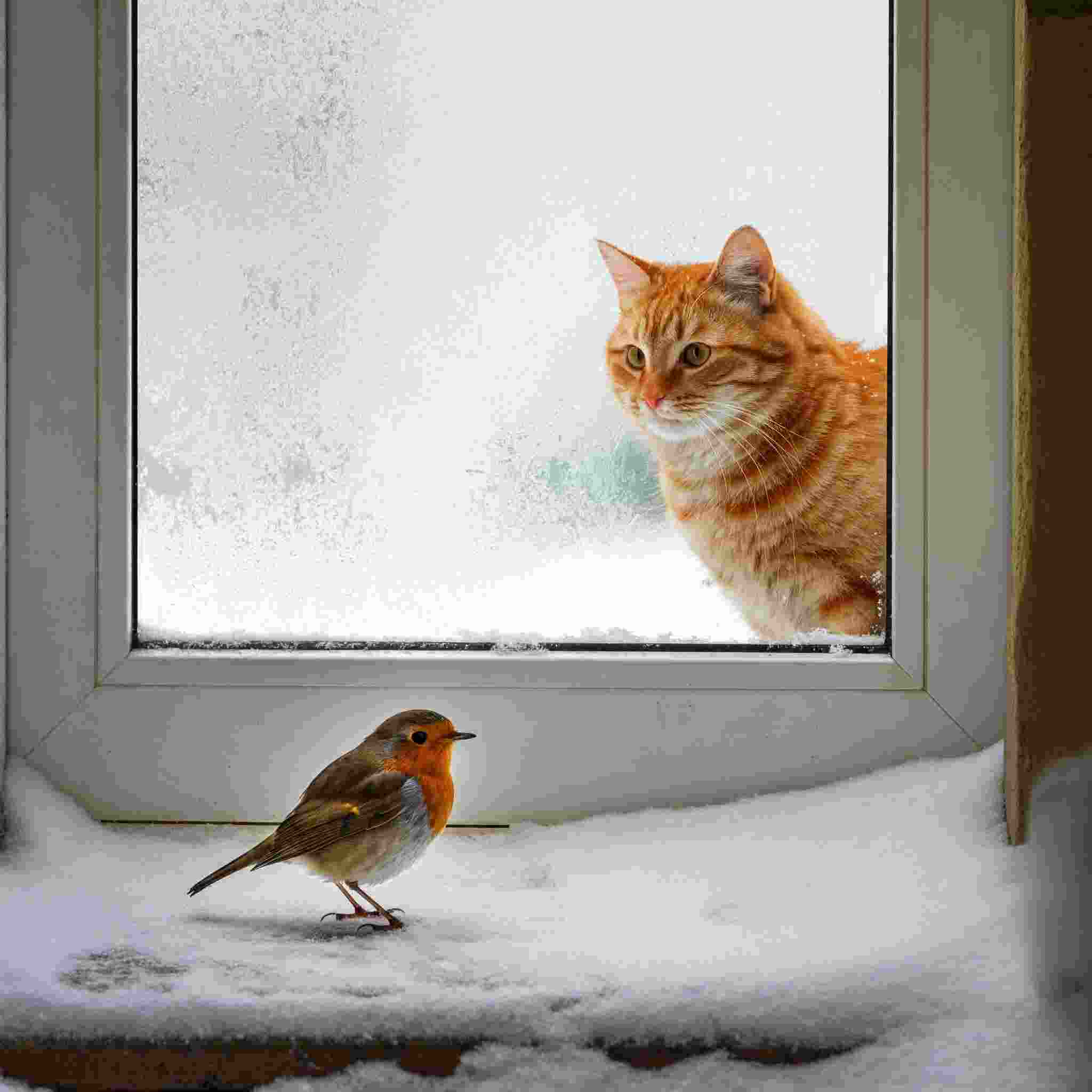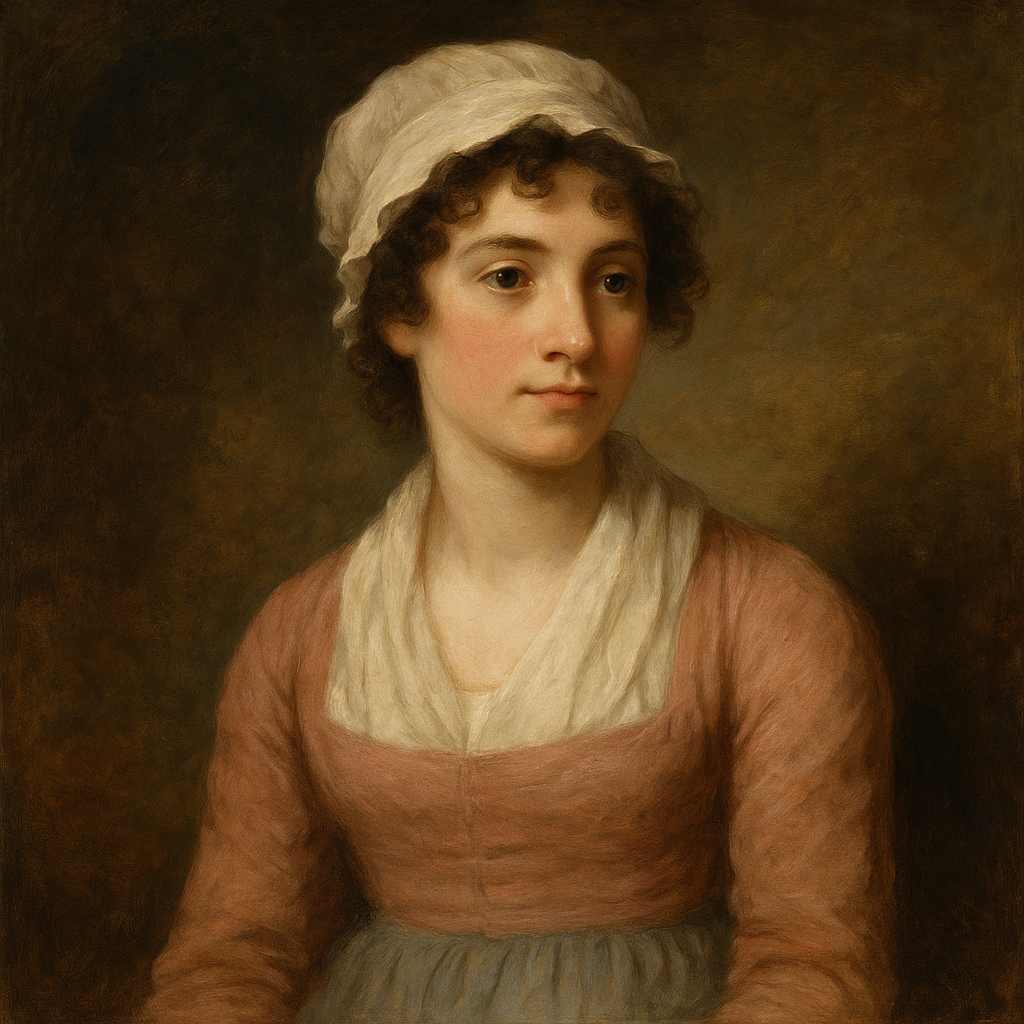The Redbreast
Charlotte Richardson
1775 to 1832

Cold blew the freezing northern blast,
And winter sternly frowned;
The flaky snow fell thick and fast,
And clad the fields around.
Forced by the storm’s relentless power,
Emboldened by despair,
A shivering redbreast sought my door,
Some friendly warmth to share.
‘Welcome, sweet bird!’ I fondly cried,
‘No danger need’st thou fear,
Secure with me thou may’st abide,
Till warmer suns appear.
‘And when mild spring comes smiling on,
And bids the fields look gay,
Thou, with thy sweet, thy grateful song,
My kindness shalt repay.’
Mistaken thought! — But how shall I
The mournful truth display?
An envious cat, with jealous eye,
Had marked him as her prey.
Remorseless wretch! — her cruel jaws
Soon sealed her victim’s doom,
While I in silence mourn his loss,
And weep o’er robin’s tomb.
So, oft in life’s uneven way,
Some stroke may intervene;
Sweep all our fancied joys away,
And change the flattering scene.
Charlotte Richardson's The Redbreast
Charlotte Richardson’s The Redbreast is a poignant narrative poem that explores themes of vulnerability, the unpredictability of life, and the fragility of hope. Structured in rhyming quatrains, the poem juxtaposes the warmth of human compassion with the cruelty of fate. The redbreast serves as both a literal character and a symbolic figure, embodying innocence and trust in the face of harsh circumstances. Through its natural imagery and emotive tone, the poem conveys a universal reflection on loss and disillusionment.
1. The Setting and Tone The poem opens with a vivid depiction of winter’s harshness:
"Cold blew the freezing northern blast,
And winter sternly frowned."
Richardson employs personification to imbue the weather with an active, almost menacing presence. The “freezing northern blast” and “winter sternly frowned” create an immediate sense of hostility in the environment, setting the stage for the redbreast’s plight. This stark atmosphere establishes a tone of adversity, underscoring the bird’s vulnerability.
The second stanza introduces the protagonist, a redbreast, seeking shelter from the storm:
"Forced by the storm’s relentless power,
Emboldened by despair,
A shivering redbreast sought my door,
Some friendly warmth to share."
Here, Richardson’s diction emphasizes desperation. Words like “forced,” “relentless,” and “shivering” highlight the redbreast’s dire condition, while “emboldened by despair” conveys a poignant paradox: despair drives the bird to seek solace despite its natural timidity. This moment also introduces the theme of trust, as the bird turns to the speaker for refuge.
2. Compassion and Hope The speaker’s immediate response to the redbreast is one of tenderness and welcome:
“‘Welcome, sweet bird!’ I fondly cried,
‘No danger need’st thou fear.’”
The affectionate tone here contrasts with the external harshness of winter. The promise of safety—“secure with me thou may’st abide”—evokes a sense of sanctuary. Richardson’s use of direct speech heightens the intimacy of this interaction, making the reader a witness to the speaker’s goodwill. The mention of “warmer suns” and “mild spring” in the following stanza introduces a hopeful vision of renewal, tying the redbreast’s survival to the speaker’s personal sense of joy and fulfillment.
3. Tragedy and Loss This hope is cruelly dashed with the arrival of an unforeseen antagonist:
"An envious cat, with jealous eye,
Had marked him as her prey."
The introduction of the cat, described as “envious” and “jealous,” shifts the tone dramatically. These adjectives personify the cat as malicious, contrasting with the earlier warmth of the speaker. The brevity of the bird’s fate—“her cruel jaws / Soon sealed her victim’s doom”—is devastating in its starkness, mirroring the abruptness with which life’s joys can be taken away. The speaker’s grief is understated but deeply felt:
"While I in silence mourn his loss,
And weep o’er robin’s tomb."
This lamentation underscores the depth of the speaker’s emotional investment in the redbreast’s survival, transforming the bird’s death into a personal tragedy.
4. Universal Reflection The final stanza broadens the poem’s scope, connecting the redbreast’s fate to human experience:
"So, oft in life’s uneven way,
Some stroke may intervene;
Sweep all our fancied joys away,
And change the flattering scene."
This stanza introduces a moral reflection, shifting the poem from specific grief to universal truth. The metaphor of life’s “uneven way” acknowledges the unpredictability of existence. The phrase “fancied joys” suggests that human expectations are often illusions, vulnerable to sudden and uncontrollable events. Richardson uses the redbreast’s story as an allegory for the fragility of hope, reinforcing the inevitability of loss in life.
Conclusion
Charlotte Richardson’s The Redbreast is a richly layered poem that weaves together natural imagery, emotional depth, and philosophical insight. Through the redbreast’s brief narrative, the poet explores themes of compassion, vulnerability, and the transient nature of joy. The juxtaposition of the speaker’s protective intentions with the cat’s merciless instinct underscores the capriciousness of fate, leaving the reader with a poignant meditation on the fragility of life. Richardson’s accessible yet evocative language ensures that the poem resonates both emotionally and intellectually, offering a timeless reflection on the interplay between hope and loss.
This text was generated by AI and is for reference only. Learn more
Want to join the discussion? Reopen or create a unique username to comment. No personal details required!



Comments
No comments yet. Be the first to comment!